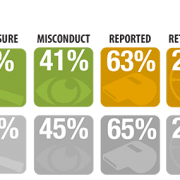Raising a Moral Company
Ethical Systems contributor Adam Grant wrote in the New York Times last week about how to raise a moral child. Drawing insights from several psychological studies, he came away with three primary suggestions:
-
Praise good character, not behavior. Children who donated marbles who were praised as being “very nice and helpful [people]” showed more generosity in a later test compared to children whose generosity was praised as “a nice and helpful thing to do.” Implicating their identity as giving individuals led to greater internalization of moral characteristics compared to merely complimenting their actions.
-
Criticize bad behavior, not character. Children prone to shame (the feeling that one is a bad person) were less likely to volunteer to fix a doll they had apparently broken compared to children prone to guilt (the feeling that one has done a bad thing). Inducing shame through anger and threats of punishment is likely to lead to avoidance or lashing out, whereas fostering a sense of guilt by expressing disappointment may lead children to confront their problems and rectify mistakes.
-
Lead by example, not preaching. Children showed increased generosity after watching a teacher figure play a game generously as opposed to selfishly. They tended to model the behavior they observed, with spoken instructions (“preaching”) having little effect. In fact, children were most generous after observing an adult who gave without saying anything at all.
Although adult cognition is very different from that of children in many ways, these lessons from developmental psychology seem readily applicable to the world of business ethics. As we have observed on our Cheating and Honesty page, identity plays a powerful role in shaping behavior–for instance, people are more strongly motivated to avoid construing themselves as “cheaters” than to avoid the act of “cheating.”
Companies would do well to encourage a sense of ethical identity through culture, managerial style, and performance measurement. If people feel that they are ethically responsible members of their team, organization, or industry, they will be more likely to make ethical decisions. Firms need to show that they value their employees’ moral judgment and reward it similarly to labor and achievement. On the other hand, unethical conduct should be met (where possible) with disapproval that does not cross over into condemning the wrongdoer’s very identity, lest the criticism become a self-fulfilling prophecy. Those who have acted badly must have the chance to feel guilt for their behavior and to attempt reconciliation or redress, or they will be unable to improve, and much of their potential may be lost.
Lastly, as we have said time and again, ethical culture must start at the top, with leaders actively demonstrating openness, honesty, generosity, and ethical reflection in ways that are visible to everyone in the organization. As with raising a moral child, raising a moral company requires those in power to do more than just talk the talk.





Excellent Summary
Excellent summary of the key points from Grant’s article. Simple points, easy to apply.